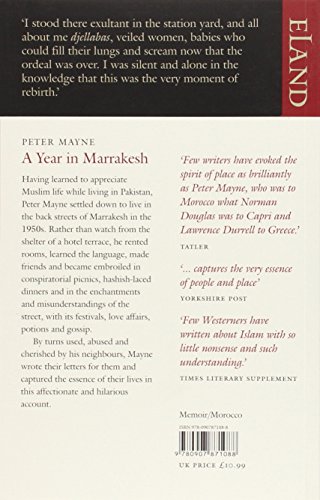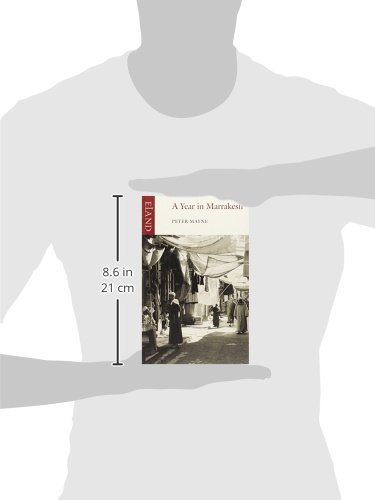



A Year in Marrakesh
N**E
Must know French...
This bk was written in 1953. The author uses many French and Moroccan arabic phrases in his writing which makes the experiences & people he encounters feel more authentic but if you aren't familiar with those languages it'd be a frustrating read. Mayne's vignettes are quirky...I never felt as though I got to know him or like him but it was a fairly quick read so I didn't care that much.There are other books that get to the heart of the Morocco better & deeper with more humor & humanity such as Tahir Shah's "The Caliph's House."
N**M
Still relevant today
Written in the 1950s, but the insights are still valuable. The author had interesting friends, and lived in several different hotels and houses, Marrakech. Many customs and habits are unchanged. A good background read before traveling to Morocco.
R**Z
I already did this. HELP HELP: I ordered ...
I already did this.HELP HELP: I ordered the Glassblower trilogy some time ago, was charged for it, but it never registered into my Kindle.
L**S
Trying to be Peter Mayle and missing.
It's an obvious attempt to clone the Peter Mayle experience, but this writer is neither as clever not as good a writer.I found his account merely tedious and self absorbed. His experience is quite limited and the telling rather snarky.
L**Y
Wonderful place.
Interesting take on Marrakesh. Gives a glimpse of one person's experience. Wonderful place.
M**K
This story
Is ok. Nothing special. A man aimlessly hangs about Marrakesh and records his regular experiences. No amazing insights or exceptional experiences. Not bad, just got tedious to get through.
C**L
Three Stars
Did not particularly like the author's writing style.
A**R
Five Stars
Charming description of Marrakesh in the 1950s -- much of which still holds true.
J**S
Another brilliant book from Eland
nother great book published by Eland, I've read quite a few of their books now and so far haven't been disappointed. A Year in Marrakesh follows Peter Mayne as he spends a year living with the locals, the reason for this is to write a novel, he feels living as he was in society, was stifling his ability to write. He moves to Marrakesh to find that bit of inner peace to be able to produce that novel he has in his head.First off I was very impressed by Peter, he doesn't just sit in his hotel room and write, he goes out and meets people and instead of using a translator he takes lessons on learning their language, this enables him to fit in better than the usual visitor to a place like this. He meets so many wonderful people and once they realise he isn't a tourist they treat him as one of their own....also as a good source of cigarettes, stamps, food and drink. He gets involved in their daily dramas, doing his part and intervening when he can....at times this did feel like a soap opera. Once word spreads of him being a writer he gets bombarded with requests for letter writing and not once does he decline. He develops some very strong bonds with some locals and the end of the book/year has some moving scenes.This book isn't the book he set out to write, this is his journal and it makes for some interesting reading, if you want an insight into what life was like in Marrakesh during the 1950's then this is the book for you.
S**R
There's sublime in the benign of solid Marrakechi earth
I very much enjoyed this sensitive and personal description of life within the Medina’s ramparts as much for Peter’s authentic writing style unfettered by hyperbole as for his all-or-nothing approach to travel. While trying to look after himself and his writing, the writer intuitively empathises with the perspectives of the locals (perhaps helped by having lived in Pakistan) without being directive to the reader, and most of the cultural insights seem to be relevant still today. When the book ended, it felt like a sad parting of a friend left behind in Marrakesh, and what a journey it’s been! The hopes, ambiguities and minor setbacks of adapting to a new country, viewed in the black-and-white romanticism of yesteryear.Clearly, the writer himself is a bit of an outsider so finds himself at home here to a large degree, and perhaps I liked the book so much because I could relate to this characteristic. This book completely appeals to the side of me that revels in making nuanced cultural and anthropological observations, and dealing with ‘hardships’ such as a lack of running water with generally little complaint. He is generally unperturbed by setbacks because he knows that these are inevitable. Sometimes it was hard to work out what was going on in various situations he is sucked into, which is probably exactly how it felt for him at the time, occasionally to bemusing effect. I also found his character to be refreshingly liberal for his era and generally remarkably non-judgemental, believing in cultural (and moral) relativity (as is found to help if you are to see things for what they truly are).On the other hand, I imagine you wouldn’t enjoy this book if you felt that a meandering memoir of daily humdrum among an array of semi-minor characters (and fowl) in the Medina sounded boring and pointless. There isn’t much manufacturing of a plot running through the story, but that is part of its authenticity to me. Also, the text is punctured with French and Arabic at times, and it may be frustrating if you do not understand any French, while a little French comprehension will certainly add a little sparkle. A minor point is that there are many characters presented – and if you have long breaks in the book, it can be easy to forget who is who, particularly the small swathe of minor characters (while a few are intriguing and difficult to place, as I sense Peter also felt).This is the ideal slim volume to accompany you on a trip to Marrakech (the Medina, Cafe de France etc.), and just as fine reading after you’ve returned when you wish you’d had a longer trip to get under the skin of the city. The book guarantees a lower hassle-factor and appeals completely to the adventurous armchair slow-traveller within.
J**E
Utterly appealing
Having lived in colonial India and Pakistan, Peter Mayne having what would be viewed as a "mid life crisis" these days decided to move to Morocco with the intention to make it his permanent home and to fund himself by writing a novel. Whilst it seems the novel never made it to publication, this book is written from his personal journals on life in Marrakesh - trying to live and be accepted by the locals, learn Arabic, make friends and understand life there.Mayne was in Marrakesh in the late 1950's but the book almost seems as if it could have been written recently. I have not been to Morocco but had no trouble imaging myself there. As someone who has gone through the challenges (and delights) of living in a country other than my own and learning a foreign language I really appreciated the book from that perspective. He allows himself to try and understand the place and the people - warts and all - without being judgemental. His style in the book is summed up in his reflections on his friends as he prepares to leave Marrakesh: "All these lovable, good people who would be surprised to be called anything of the sort. They, who have never gone away - how should they know what parting means, that it means dying a little."The text includes Arabic and French which adds to the flavour and that feeling of not understanding. I suspect if I remembered more French I could have enjoyed it even more. Mayne does a good job of allowing you to follow the theme even though you don't understand all the words rather than simply translating everything.Very enjoyable. I thoroughly recommend it.
A**R
Quirky, unpretentious and entertaining
Firstly, people who have criticised this book for being in some way 'imperialist' etc, are taking themselves too seriously. The book was written in the 1950s and as such some of the nomenclature (e.g. the spelling of Marrakesh or the use of the word 'Moor' to describe North African Muslims) is jarring to the politically correct modern reader but this is nothing more than anachronistic nomenclature.In fact, Peter Mayne treats all the people he encounters in his year in Marrakesh with straightforward, honest humanity. What I particularly liked about this book is that Mayne's story isn't that of a wealthy baby-boomer playing at 'finding themselves' by buying-up a Riad in which to semi-retire (see Cinnamon City ) or a pretentious hippy or gap-yar student out to 'find themselves'. He's just an ordinary person from one part of the world living an ordinary life amongst ordinary people in another part of the world.The prose completely lacks gushing melodrama or flowery descriptions but the people it paints are all the more authentic, and attractive in their flaws, because of that. Cinnamon City
L**G
A gentle tale
Nothing exciting but still keeps you interested. A well written book that amuses and informs you about a time now mostly lost
Trustpilot
3 weeks ago
1 week ago